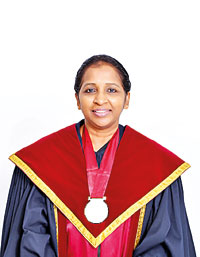News
Spotlight on ‘Feed a Child’
View(s):- Inauguration of the 25th Annual Scientific Congress of the Sri Lanka College of Paediatricians today
By Kumudini Hettiarachchi and Dilushi Wijesinghe
For these healers, it will not be just an academic congress but a meeting where they can hold their heads high and say they have gone beyond the call of duty to bring about changes in the lives of children.
“We have made a very positive impact on the nutritional levels of children,” the President of the Sri Lanka College of Paediatricians (SLCP), Prof. Guwani Liyanage told the Sunday Timesthis week as the countdown began for today’s inauguration of the 25th Annual Scientific Congress on the theme ‘Child Health: Navigating through Crises’ in Colombo.

Prof. Guwani Liyanage
There is much proof of the SLCP navigating through crises with two fine examples being its active involvement in a programme to meet dire shortages of medicines and consumables and the unique ‘Feed a Child’ programme.
Pointing out that at the core of everything the SLCP does is the upliftment of child health, Prof. Liyanage explained how they went out of their usual routine to respond to medicine shortages. As always, Sri Lankans at home and abroad were ready to donate essential medicines, while seeking assurances that their donations served those who deserved them most. Walking the talk, the SLCP stepped beyond its advocacy role and provided legitimacy to the donations.
Next, the SLCP addressed under-nutrition among children which was a gigantic task, she said, detailing how the SLCP’s national-level approach was multi-pronged. It included – webinars for first-contact doctors of all nine provinces on screening, early identification, timely referrals and treatment of under-nutrition, followed by a four-month, multi-centre cross-sectional study representing urban, rural and estate sectors from selected provinces (Gampaha, Jaffna, Nuwara Eliya and Ratnapura) last year to assess the effect of the economic crisis on child nutrition.
The findings in the areas where the SLCP study was done:
15.1% of children under-5 were underweight
12.9% of children under-5 were stunted
The SLCP had also been a part of the stakeholders’ meeting to design the ‘National Emergency Nutrition Plan’ of the Health Ministry, while the SLCP simultaneously initiated the ‘Feed a Child’ programme through the country’s well-structured primary healthcare model, in collaboration with the Family Health Bureau.

The SLCP Council 2023
Prof. Liyanage said: “The programme targeted children with severe acute malnutrition (1,500 children) in the most disadvantaged areas of Nuwara Eliya and Anuradhapura. Later it was extended to cover moderate acute malnutrition (5,000 children) as well. They were given a dry ration pack worth Rs. 3,300 every two weeks for 6 months. The programme was valued at Rs. 205 million, with SLCP members, particularly the seniors seeking help from donors known to them personally and professionally.
“It had an empowerment arm as well. Nutritional education included one-pot, easy-to-prepare nutritious recipes of the SLCP which were a hit as well as family empowerment programmes with backyard poultry rearing and home gardening for sustainable food security. We liaised with the local government secretariat, veterinary surgeons, agriculture officers and many more. This is a unique model created by the SLCP and a few Medical Officer of Health (MOH) areas in Moneragala and Gampaha have adopted it.”
Stressing the importance of reviewing a programme that is being implemented, Prof. Liyanage said they monitored 650 children with severe acute malnutrition. With the implementation of the ‘Feed a Child’ programme, 94% had at least some weight gain; the weight of 14% got back to normal; and 38% moved to less severe forms of under-nutrition. However, 42% of the balance 48%, remained as severe acute malnutrition, despite some weight gain, while 6% did not show any increase in their weight.
Why is it that some of them did not respond, she asked, replying that it could still be nutritional, yet beyond nutrition, including other factors such as underlying chronic/recurrent illnesses.
This is why the SLCP is exploring the reasons through two collaborative research projects with the World Food Programme (WFP) and UNICEF.
“This is a quest to shed light on the timing of growth faltering and its association with feeding practices, socio-demographic and biological risk factors. These findings would be valuable for policymakers and programme implementers,” Prof. Liyanage added.
| Eminent guests at inauguration The 25thAnnual Scientific Congress of the SLCP will draw 20 speakers from abroad and 30 from Sri Lanka. Those who have flown down are from the United Kingdom (UK), Australia, Pakistan and India. The main sessions are on May 15 and 16. The chief guest at today’s inauguration is the President of the Royal College of Paediatrics and Child Health, UK, Dr. Camilla Kingdon, while the Guests-of-Honour are the President of the Asia Pacific Paediatric Association, Prof. Iqbal Memon and the Dean of the Faculty of Medical Sciences, University of Sri Jayewardenepura, Prof. Aloka Pathirana. The Prof. C.C. de Silva oration titled ‘Childhood Diabetes Mellitus in Sri Lanka: A Kaleidoscope View’ will be delivered by Consultant Paediatric Endocrinologist Dr. Navoda Atapattu. This year, the SLCP has inaugurated two special awards for: ‘The most outstanding early career paediatrician’ and ‘The best research publications’ for paediatricians and paediatric trainees’.
| |
The best way to say that you found the home of your dreams is by finding it on Hitad.lk. We have listings for apartments for sale or rent in Sri Lanka, no matter what locale you're looking for! Whether you live in Colombo, Galle, Kandy, Matara, Jaffna and more - we've got them all!

